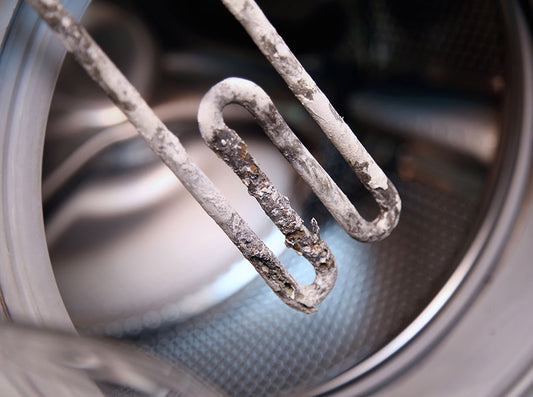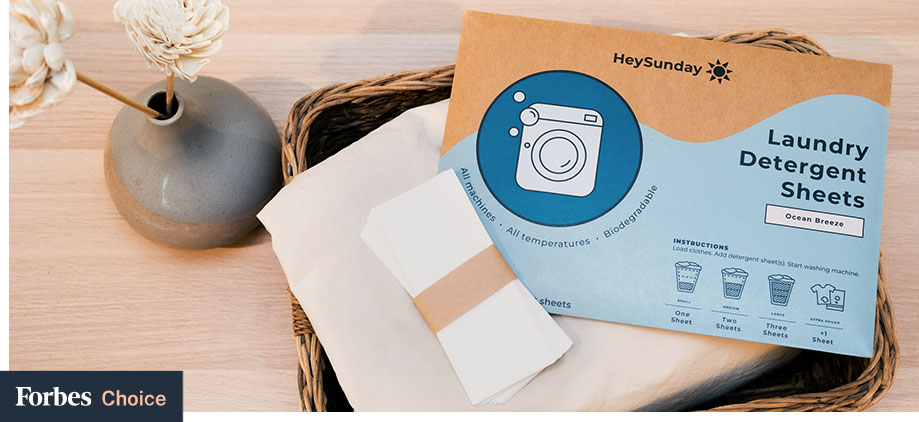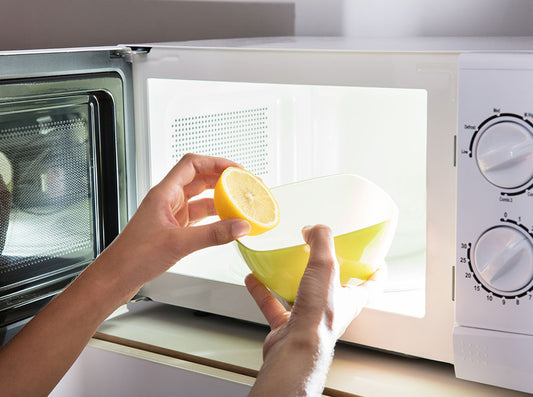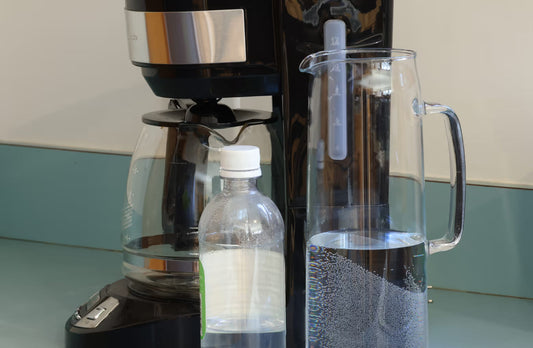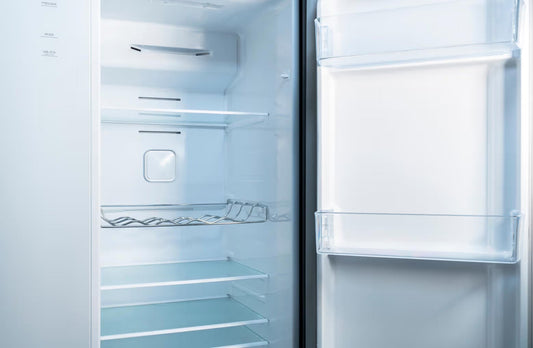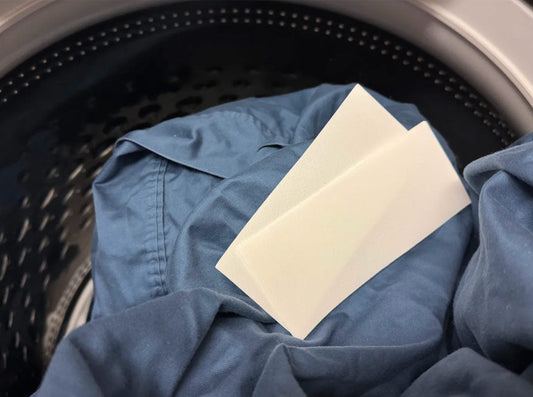An estimated 85% of Americans live with "hard water," or water that contains high levels of dissolved calcium and magnesium. These minerals aren't harmful to consume, but they can cause more than a few headaches around the house.
Hard water makes soap less effective and leaves cloudy spots on clean dishes. Over time, it can create chalky buildup in pipes, appliances, and faucets. That buildup can clog plumbing and reduce the lifespan of your washing machine or water heater. If you've ever felt like your clothes still feel stiff after washing or noticed your skin is dry after a shower, hard water may be to blame.
Hard water is most common in areas where groundwater moves through limestone and other sedimentary rocks, which naturally release calcium and magnesium into the water. But even if you don't live in one of these regions, it's helpful to recognize the signs of hard water and know how to minimize its effects on your home and laundry.
In this guide, HeySunday breaks down what hard water is, why it's so common in the U.S., which areas have the hardest water, and what you can do to manage it. Whether you're dealing with dingy clothes or stubborn soap scum, understanding your water quality is the first step toward fixing it.
What is hard water?
Hard water is water with high levels of dissolved calcium and magnesium. These minerals are picked up naturally as groundwater flows through rock, especially limestone, dolomite, and gypsum. The more time water spends in contact with these materials, the more minerals it absorbs.
Hardness is measured by the concentration of calcium carbonate in milligrams per liter (mg/L). This number clearly indicates how hard or soft your water is.
Here's how water hardness is measured:
- Soft. 0 mg/L to 60 mg/L. Soap lathers easily, and scaling is rare.
- Moderately hard. 61 mg/L to 120 mg/L. You may start to see mild buildup on dishes or fixtures.
- Hard. 121 mg/L to 180 mg/L. Soap scum is more common, and laundry can feel stiff or look faded.
- Very hard. Over 180 mg/L. Buildup is frequent, and mineral deposits may clog pipes or damage appliances.
Unlike chemical contamination, hard water isn't a safety concern. It won't make you sick or violate drinking water standards. But it does create problems that add up over time.
Soap doesn't work as well in hard water because the minerals interfere with suds formation. You may need to use more detergent to get clothes clean, or find that the shampoo doesn't rinse completely. Hard water can also leave scale deposits in appliances that reduce efficiency and shorten lifespans.
You don't have to live in a high-risk region to be affected. Even moderately hard water can cause daily annoyances. That's why understanding what hard water is and how to measure it is the first step in managing its impact on your home.
Where is hard water most common in the U.S.?
In reality, it's a nationwide issue. For most American households, tap water contains high levels of calcium and magnesium. The severity of water hardness varies across the country, but some areas experience it more intensely due to local geology. Regions and cities frequently cited for having very hard water include:
- Midwest. Indiana and Minneapolis both rely on groundwater sources with elevated calcium and magnesium levels.
- Southwest and West. Phoenix and Las Vegas draw from desert aquifers rich in minerals due to their dry climate and geology.
- South and Southeast. San Antonio's water comes from the Edwards Aquifer, which is high in calcium, while Tampa, Florida, also reports high hardness, partly due to natural minerals and local treatment processes.
To understand just how hard water can get, the U.S. Geological Survey tracks data from wells and aquifers across the country. These measurements show that some groundwater sources reach extreme hardness levels:
- Wyoming (alluvial aquifers, September 2014): 557 mg/L.
- South Dakota (glacial aquifer system, August 2014): 470.7 mg/L.
- New Mexico (High Plains aquifer, April 2015): 208.8 mg/L.
If you live in one of these regions, your water is likely working against your soap—and possibly your plumbing.
Why does hard water matter?
It's not dangerous to your health, but hard water can be a real problem around the house. Its high mineral content interferes with everyday tasks, silently wearing down your appliances and making cleaning more of a chore.
One of the most noticeable effects is how hard water reacts with soap. Instead of forming a rich lather, soap tends to clump or leave behind residue. This reduces its effectiveness, whether you're washing dishes, scrubbing a shower, or cleaning your hands. The minerals in hard water bond with soap to create a sticky film known as soap scum, which doesn't rinse away easily.
You'll often see the results on your dishes and fixtures. Glassware may come out of the dishwasher with cloudy spots, and faucets and sinks can develop white crusty buildup. Over time, minerals accumulate in pipes, water heaters, and other appliances, forming what's known as scale. This buildup can slow water flow, reduce heating efficiency, and shorten the lifespan of plumbing and equipment.
Hard water can also create headaches in the laundry room. Clothes washed in hard water may come out feeling stiff, looking faded, or developing a scratchy texture over time. Because soap doesn't work as well, you often have to use more detergent to get clothes clean, and even then, the results might not be ideal. Hard water can also leave mineral deposits inside washing machines, especially around heating elements and detergent compartments.
The longer you live with hard water, the more its effects add up. From dull clothes to clogged appliances, it can cause wear and tear in places you don't always notice until repairs or replacements are needed. That's why understanding and treating hard water is more than just a maintenance tip—it's a smart way to protect your home.
What can you do about hard water?
If you're dealing with hard water at home, you're definitely not alone. While you can't change your local geology, you can take steps to reduce its effects, especially on your laundry, appliances, and plumbing.
Water softening solutions
Installing a water softener is one of the best ways to handle hard water. An ion-exchange softener that replaces calcium and magnesium ions with sodium or potassium is the most common type. These systems are usually installed at your home's main water line, allowing them to treat all water before it reaches your faucets and appliances.
Other treatment options include magnetic, electronic, or chemical conditioners. These systems claim to alter how minerals behave in water rather than removing them entirely. While they tend to be cheaper and easier to install, their effectiveness varies widely depending on water composition and household use.
Laundry tips
Even without a full water softening system, you can take steps to minimize hard water issues in the laundry room:
- Use residue-free detergent sheets. Those that fully dissolve in hard water reduce the amount of streaks or film that can appear on glassware and are especially useful for homes with hard water.
- Add softening agents. Products like borax or washing soda can help neutralize mineral content and boost cleaning power.
- Clean your machine. Regularly running a cleaning cycle or using vinegar can help prevent mineral buildup inside your washer.
Other household tips
Hard water affects more than just your laundry. Simple daily habits can help reduce mineral residue:
- Wipe down fixtures. Drying faucets, sinks, and glassware after use prevents spots and crusty deposits.
- Descale regularly. Clean your coffee maker, shower head, and dishwasher to keep them running efficiently.
While hard water might be unavoidable, managing its impact doesn't have to be difficult. A few consistent habits and the right tools can go a long way in keeping your home running smoothly.
Making peace with hard water
Hard water affects the vast majority of U.S. households. While it isn't harmful to drink or cook with, its effects can show up just about everywhere else—in your laundry, your dishwasher, your shower, and even your plumbing. From spotty dishes and soap scum to clogged pipes and faded clothes, hard water can quietly wear down your home over time.
But it becomes much easier to manage once you understand what hard water is and why it happens. Knowing your local water hardness level gives you a starting point. From there, small adjustments, like switching laundry detergents or adding water softening agents, can make a noticeable difference. For more persistent problems, a whole-home softener can help eliminate mineral buildup at the source.
Not every solution needs to be expensive or complicated. Wiping down fixtures, regularly cleaning appliances, and paying attention to subtle changes in water performance can go a long way toward protecting your home.
Whether you live in a known hotspot like Phoenix or Minneapolis or somewhere in between, hard water is likely part of your daily life. Fortunately, so are the tools to deal with it.
